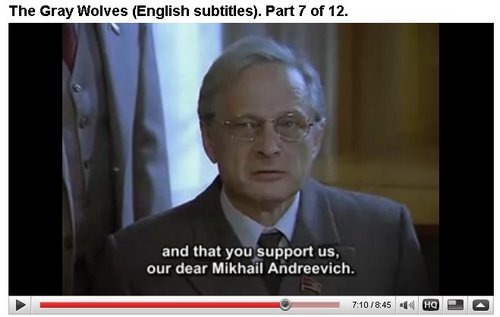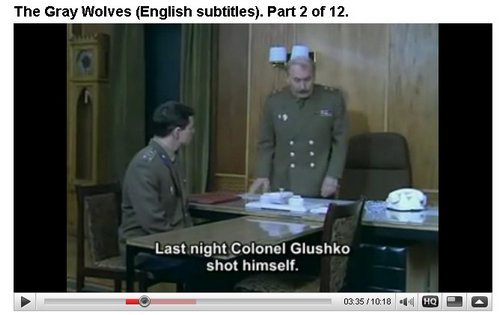We’re about 2/3 of the way through The Gray Wolves (Serye volki).
At first I wondered if I had remembered the events of 1964 wrongly. The conspirators were talking about replacing Nikita Khruschev in November, but I thought it had happened before that. I recall that it happened during the presidential campaign, and that it was a final nail in the coffin for Barry Goldwater, whom I was doing as much to support vocally as could be done by a high school junior in rural Minnesota. The media were doing as much as they could to use this coup de etat to finish off Goldwater by putting out the line that during times of uncertainty, nobody likes to throw out the established leader. (They maybe weren’t in the tank for Lyndon Johnson as much as they are now for Obama, but they were far from neutral, objective reporters.)
I don’t know all of the historical characters in the movie, so tonight I’ve been spending some time looking some of them up on Wikipedia.
For most of the movie I wondered where Kosygin was in all of this. That was a name I did know. The information we in the U.S. got when Khruschev was thrown out was that Breshnev and Kosygin were now in charge. Of course, Kosygin became less prominent and Brezhnev more as time went on, but I had assumed he was in on the conspiracy. He hasn’t been seen in the movie, but at least his name was finally mentioned about 2/3 of the way through.
Mikoyan was a name I recognized, but other than that I didn’t remember much about him. It appears that he’s with Nikita Sergeyevich at Pitsunda. Wikipedia gives me a clue as to what’s really happening with him — and what to expect from him in a scene towards the end.
One person I knew absolutely nothing about was the one portrayed in the above screen shot — Mikhail Andreevich Suslov. In the movie he seems to be a person who was brought into the conspiracy and who went along with it because he made a political calculation. But after reading that article I came away with a chilling portrait of an intelligent, intellectual cut-throat — the worst kind.
But this blog is supposed to be about more superficial things, so I should point out that I never would have recognized by myself that it was Rolan Bykov who was playing Khruschev. He’s playing a very credible Khruschev, at least for this outsider.
But the Leonid Brezhnev character seems so young — and so unsure of himself. The acting is good, but do Russians consider that to be a realistic portrayal?
And what is the deal with these Russian desks that have a smaller, plainer table for guests portruding from the front? I’ve never seen anything like that in the U.S. But I do see these on RTR Planeta, e.g. when somebody holds talks with Putin. Is it strictly a Russian thing, or is that kind of furniture used anywhere else?


